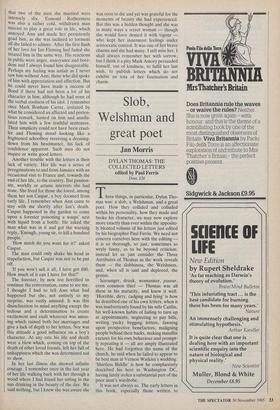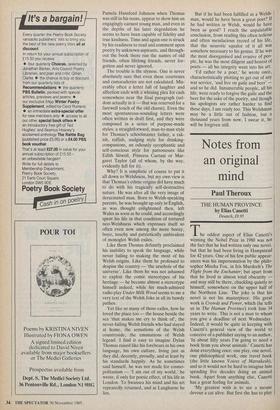Slob, Welshman and great poet
Jan Morris
DYLAN THOMAS: THE COLLECTED LETTERS edited by Paul Ferris
Dent, £20
Three things, in particular, Dylan Tho- mas was: a slob, a Welshman, and a great poet. How they collided and colluded within his personality, how they made and broke his character, we may now explore more exactly than ever within the apposite- ly bloated volume of his letters just edited by his biographer Paul Ferris. We need not concern ourselves here with the editing — it is so thorough, so just, sometimes so wryly funny, as to be beyond criticism: instead let us just consider the Three Attributes of Thomas as the work reveals them — the slobbiness, the Welshness, and, when all is said and deplored, the genius.
Scrounger, drunk, womaniser, poseur, even common thief — Thomas was all these in his maturity, and knew it well. 'Horrible, dirty, cadging and lying' is how he described one of his own letters, when it was inadvertently found by his wife Caitlin; his well-known habits of failing to turn up at appointments, neglecting to pay bills, writing yucky begging letters, fawning upon prospective benefactors, maligning people behind their backs, making maudlin excuses for his own behaviour and prompt- ly repeating it — all are amply illustrated here. He had forgotten the name of the church, he said when he failed to appear to be best man at Vernon Watkins's wedding. 'Shirtless Biddle' is how he complacently described his host in Washington DC, having lately stolen a substantial part of the poor man's wardrobe.
It was not always so. The early letters in this book, especially those written to Pamela Hansford Johnson when Thomas was still in his teens, appear to show him an engagingly earnest young man, and even in the depths of his later degradation he seems to have been capable of fidelity and true kindness. Time and again one is struck by his readiness to read and comment upon poetry by unknown aspirants, and through- out the book there run the names of old friends, often lifelong friends, never for- gotten and never ignored.
The trouble is the slyness. One is never absolutely sure that even these courtesies and camaraderies are not calculated. Mis- erably often a letter full of laughter and affection ends with a whining plea for cash somewhere near the final paragraph (sel- dom actually in it — that was reserved for a farewell touch of the old charm). Even the most spontaneous-sounding letters were often written in draft first, and they were composed in a series of purpose-made styles: a straightforward, man-to-man style for Thomas's schoolmaster father, a rak- ish, raffish, nudging style for drinking- companions, an odiously sycophantic and self-conscious style for patronesses like Edith Sitwell, Princess Caetani or Mar- garet Taylor (all of whom, by the way, evidently fell for it).
Why? It is simplistic of course to put it all down to Welshness, but my own view is that Thomas's ethnic origins did have much to do with his tragically self-destructive nature. He was after all the very image of deracinated man. Born to Welsh-speaking parents, he was brought up only in English, as was thought enlightened then, left Wales as soon as he could, and accordingly spent his life in that condition of tortured neo-Welshness which expresses itself so often even now among the more boozy, boyo, touchy and patriotically ambivalent of monoglot Welsh exiles.
Like them Thomas defiantly proclaimed his inability to speak the language, while never failing to making the most of his Welsh origins. Like them he professed to despise the country — 'the arsehole of the universe'. Like them he was not ashamed to exploit the comic stereotypes of his heritage — he became almost a stereotype himself indeed, while his much-admired radio play Under Milk Wood seems to me a very text of the Welsh Joke in all its bawdy pathos.
Yet like so many of those exiles, how he loved the place too — the house beside the sea 'that makes me cry to think of, the never-failing Welsh friends who had stayed at home, the sensations of the Welsh countryside, the emanations of Welsh legend. I find it easy to imagine Dylan Thomas raised like his forebears in his own language, his own culture, living just as they did, decently, proudly, and at least by his standards happily. As he sometimes said himself, he was not made for cosmo- politanism — 'I am out of my world,' he wrote, if only for poetic effect, of his life in London. To Swansea his mind and his art repeatedly returned, and at Laugharne he lies.
But if he had been fulfilled as a Welsh- man, would he have been a great poet? If he had written in Welsh, would he have been as good? I reach the unpalatable conclusion, from reading this often tedious and often mendacious record of his life, that the neurotic squalor of it all was somehow necessary to his genius. If he was the most disorganised and evasive of peo- ple, he was the most diligent and honest of poets — all his integrity went into his art.
'I'd rather be a poet,' he wrote once, characteristically plotting to get out of any war service, 'and live on guile and beer' — and so he did. Innumerable people, all his life, were ready to forgive the guile and the beer for the sake of the poetry, and though his apologists are rather harder to find these days, I am ready too. This Welshman may be a little out of fashion, but a thousand years from now, I swear it, he will be forgiven still.



























































 Previous page
Previous page